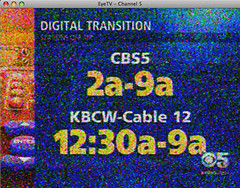
|
|||||||||||||||||||||||||||||||||||||||||||||||||||||
|
Still getting a few analog stations.
John Blossom: "Journalists stay in business by cultivating relationships with sources - that's a pretty universal fact, not just with the tech press. It's always a dance to avoid getting too close and cushy for the sake of something less than pure motivations. In today's environment, though, the multiplicity of online channels in any market segment in conjunction with purely social media buffers us against this kind of corruption. As soon as someone spoons too lovingly for something they get outed." My response: "John, that's why blogging took off -- because the tech press was so rotten with the vendors, they'd never say anything negative about them. So when you wanted to find out if a product really worked, you'd do what we do now -- listen to other users. Amazon built an empire on that idea. Of all the Web 2.0 companies they may be the only ones who get that the press doesn't control what users know anymore, that the users are getting it for themselves." The cycle of users taking control of the tech industry and press goes back a long, long way. My first experience was in the late 70s, as a grad student in comp sci. I'd go to the student library, a quiet reading room where they left copies of the computer industry publications. I remember leafing through them thinking that this stuff seemed overly complex and irrelevant. When my generation went out into the world, we started over. That's the cycle. It has always seemed possible to me that a company could make the transition from one generation to the next without getting caught in the gears, but I've yet to see it happen. Maybe the closest is Apple, but they went through hell between the advent of the web which overturned a lot of their assumptions and the rebirth of Apple under Steve Jobs 2.0. These days the press can reform itself very quickly because the printing presses are very cheap. It cost News.com millions of dollars to start up in the 90s. TechCrunch started four years ago with nothing but a Wordpress installation and an entrepreneur with a little extra time. So when the press gets too cozy with industry, the next layer of the press forms in an instant. When users want to know if the products really work they just inform each other. BTW, much of the press now calls themselves bloggers. They can do that, no one owns the trademark. But that doesn't mean they are immune to being routed around by bloggers. It's as if you changed the name of "rain" to "sunshine." You'd still need an umbrella. |
"The protoblogger." - NY Times.
"The father of modern-day content distribution." - PC World.
One of BusinessWeek's 25 Most Influential People on the Web. "Helped popularize blogging, podcasting and RSS." - Time.
"The father of blogging and RSS." - BBC.
"RSS was born in 1997 out of the confluence of Dave Winer's 'Really Simple Syndication' technology, used to push out blog updates, and Netscape's 'Rich Site Summary', which allowed users to create custom Netscape home pages with regularly updated data flows." - Tim O'Reilly.
My most recent trivia on Twitter. On This Day In: 2008 2007 2006 2005 2004 2003 2002 2001 2000 1999 1998 1997. |
||||||||||||||||||||||||||||||||||||||||||||||||||||
|
© Copyright 1997-2009 Dave Winer. Previous / Next |
|||||||||||||||||||||||||||||||||||||||||||||||||||||




